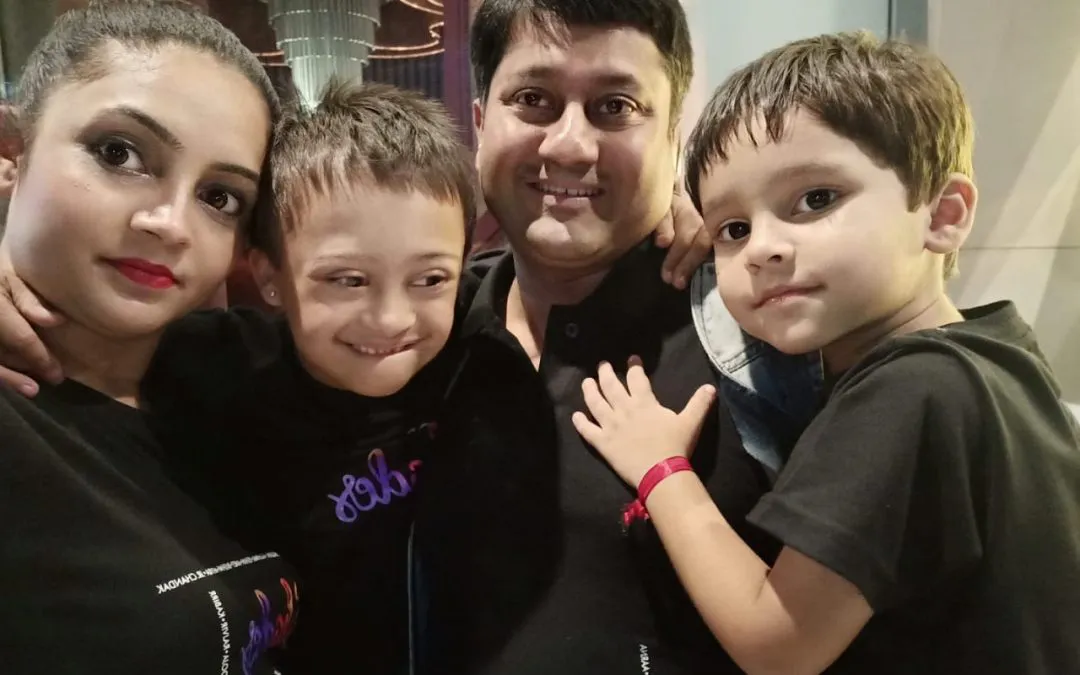In Indian culture, a mother has been revered as the first and foremost GURU in one’s life. It is absolutely crucial how this potter shapes the child in the early days of a child. But perhaps it is more so for a special child…
Just a few days back I got a call and WhatsApp message from Nayi Disha, that they are planning to compile a unique video capturing the expressions of various parents for the following set of questions –
• Remember the first time you saw your child
• Think about the first time you heard them laugh
• Recall the first time they called you Ma or Pa
• Look at them and think about what they mean to you
• Think about your favorite memory with them
When I was talking about this message with Shlok’s mom (Sheetal), two things happened. Sheetal was already off to her vivid memory lane thinking about those situations a decade back when Shlok was born in the USA. On the other hand, I was able to remember the factual/medical aspects but hardly could recollect emotional cues. Perhaps it’s a guy thing. Jokes apart, we went on to make a video clip capturing Sheetal’s expressions for those memories and now the video clip itself has become a nice memory for the times to come…
I was stunned to read about a recent study on Boston University’s website which mentioned that mothers of special individuals had levels of stress hormones comparable to soldiers in combat. Finances are often a source of stress as well. Usually, the mother sacrifices her career to attend to the child’s needs. The emotional impact is enormous and may include:
• Fear and worry about:
o The child’s pain and suffering
o The child’s future
o The question of whether you are doing enough or doing the right things to help the child
• Guilt over:
o The limits of your ability to protect the child
o The loss of attention toward other children, the spouse, and aging parents
o Your jealousy and resentment of those with “normal” children
• Feelings of isolation because you:
o Miss out on many family-oriented activities because of child’s disability prevents her/him from successfully participating
o Encounter criticism and judgment of your parenting from others who don’t understand your child’s disability
o Feel like an outsider around parents of typically developing children
• Grief over:
o The loss of hopes and dreams you had for the child
o Not having the parenting experience you’d imagined
o Recurrent reminders of what your child misses out on leads to chronic sorrow
I often mention that we were lucky to have Shlok born in the USA as we could get the benefit of home-based early intervention as well as a more practical approach to handling a special child. But more importantly, Sheetal has always stood strong and tall for Shlok for the most part. Unlike me, she is a doer rather than a thinker! Her approach is simple. Just do what requires to be done and enjoy life!!! Another interesting aspect is that Shlok learns by doing things by hand (I guess, the kinesthetic mode is predominant for down’s syndrome kids). Another important aspect is that Shlok is relatively well-behaved if he has a set routine. So she keeps herself occupied with various activities for Shlok and tries to maintain an orderly daily routine for him. There have been interesting incidences lately that show the power of forming good habits. During Covid-19, we had to train him to use a mask and Amsarveda Mouth Sanitizer just for 2-3 weeks. He likes the bittersweet taste of turmeric-licorice spray. Now at times, we forget, but he would always remind us to follow the regimen!!!
As Sheetal puts it rightly, every special child is different, and every family’s circumstances are different. So, one solution that fits all is surely not possible. But she made sure NOT to pamper Shlok out of undue sympathy and treated him more so as a normal child. Yet she has been meticulous to maintain good habits with healthy food, good sleep, and personal care. She makes sure that Shlok can explore things on his own and not get into the trap of being overly instructive to him.
Parents of children with special needs are often exhausted and frequently become depressed. To be sustained through the marathon of caring for a child with special needs, it is essential that parents attend to their own needs. I have seen Sheetal’s efforts to balance out her passion as a make-up artist and a special mom. And it has actually helped him to become a better person. Now she is at a budding stage to pursue a career as a freelance make-up artist. The pursuit that keeps her happy is actually the engine for happiness for the rest of the family…
P.S. Also visit my Blogspot to read more articles on https://shlokabiity.blogspot.com/
Read more on Metro Trains & Dhruv 🙂





